Knowing what foods your dog can and cannot eat is crucial for their health and safety. While some human foods are perfectly safe and even healthy for your canine companion, others can be highly toxic, even in small amounts. Each year, over 400,000 pet poisonings occur in the United States, with common household foods being a significant contributor.
As a responsible pet parent, being prepared with accurate information on foods to avoid is essential. This comprehensive guide will serve as your essential “cheat sheet” to help keep your furry friend safe and healthy, focusing on what food not to feed your dog and offering insights into safe alternatives.
Why Certain Foods Are Toxic to Dogs
Canine digestion and metabolism are vastly different from our own, which explains why humans can safely consume many foods that are harmful or even deadly to dogs. Dogs’ bodies process certain substances in unique ways. For example, theobromine and caffeine, found in chocolate, are metabolized much slower by dogs than by humans. This slower processing means these substances can rapidly accumulate in their systems, potentially leading to fatal consequences.
Similarly, while humans can easily digest cherries, the cyanide present in their pits, stems, and leaves can pose a significant problem if ingested by your dog in large quantities. Additionally, these pits can cause gastrointestinal obstruction and diarrhea due to their indigestibility, making it safest to avoid them altogether. It is also important to remember that food toxicity can vary based on a dog’s size, breed, and overall health condition. Therefore, consulting your veterinarian is always recommended if you have any questions about specific foods your dog cannot eat.
Common Human Foods Dogs Cannot Eat
Many common household foods are dangerous, and often toxic, to dogs. Some of the most frequently identified culprits include alcohol, avocados, macadamia nuts, grapes and raisins, xylitol, and chocolate. This section details a comprehensive list of foods your dog should absolutely avoid to ensure their safety. It’s vital to understand what can t you feed your dog to prevent accidental poisonings.
Alcohol
Because of their smaller size, alcohol can have a much deadlier effect on dogs and cats than on humans. Even minimal amounts of alcohol can cause severe harm, with the danger increasing proportionally to the pet’s smaller body weight. Symptoms of alcohol poisoning in dogs mirror those in people, including vomiting, breathing difficulties, coma, and even death.
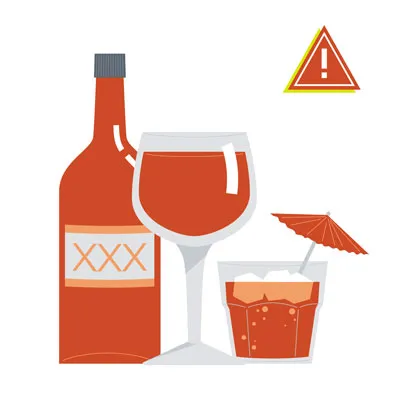 Open bottle of alcoholic beverage next to a glass
Open bottle of alcoholic beverage next to a glass
Apple, Apricot, Cherry, and Plum Seeds/Pits
While the fleshy part of apples is generally safe for dogs, the core and especially the seeds are not. Apple seeds contain cyanide, and though small amounts may not immediately be fatal, it is best to avoid the core and seeds entirely. The pits and seeds of apricots, cherries, peaches, and plums should also be strictly avoided. These fruit pits also contain cyanide, which can lead to severe symptoms such as vomiting, irregular and rapid heartbeat, seizures, coma, and even death, by impairing the red blood cells’ ability to carry oxygen.
Avocado
Avocados are not a suitable food choice for dogs. Historically, there have been reports, such as two dogs in South Africa dying from myocardial damage after consuming avocados. While these specific results have not been consistently replicated, avocados are known to cause issues in other mammal species. Furthermore, an intact avocado pit can cause a dangerous gastrointestinal obstruction if swallowed by a dog, making it prudent to avoid this fruit.
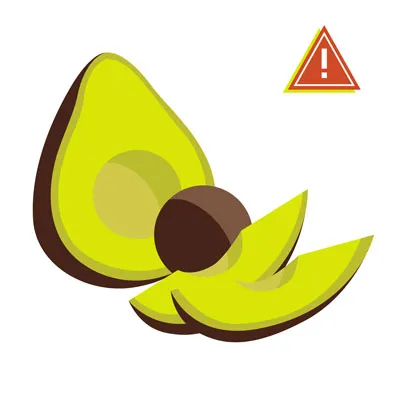 Two halves of a ripe avocado on a wooden cutting board
Two halves of a ripe avocado on a wooden cutting board
Broccoli
Broccoli contains isothiocyanates, which can be harmful to pets if consumed in very large doses. While small, occasional amounts of broccoli might be acceptable, it is generally safer to choose from the many other healthy food options available for dogs. Additionally, broccoli stalks can sometimes pose a choking hazard or cause an obstruction in a dog’s throat.
Caffeine and Coffee Grounds
Caffeine contains methylxanthines, which can induce potentially fatal diarrhea, vomiting, seizures, and an irregular heartbeat in dogs. If your dog accidentally ingests coffee grounds or any highly caffeinated drink, their heart rate may significantly increase. This can lead to a range of severe symptoms including seizures, tremors, arrhythmia, and difficulty breathing.
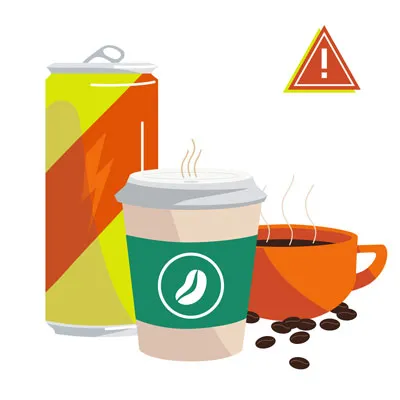 Coffee beans and grounds with a coffee cup
Coffee beans and grounds with a coffee cup
Chicken & Turkey Skin, Ham, and Other Fatty Cuts of Meat
When it comes to fatty cuts of meat, ham, and other high-fat items like chicken or turkey skin, it is always safer to discard them rather than offer them as treats to pets. These foods are harmful to dogs due to their high-fat content, which can trigger acute pancreatitis—a life-threatening illness with serious complications. It’s crucial to understand what meat should you not feed your dog to protect their health.
Avoid turkey and chicken bones, as well, because they can splinter and cause bowel obstruction or damage to the stomach or intestines. Such damage can sometimes result in a puncture, leading to a fatal abdominal infection.
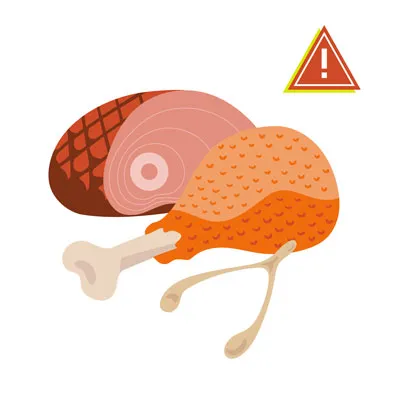 Various cuts of raw and cooked meat including chicken, turkey, and ham
Various cuts of raw and cooked meat including chicken, turkey, and ham
Chocolate
Chocolate toxicity is a frequent cause of pet poisoning, especially during holidays. Your dog should absolutely never consume any chocolate product. Chocolate contains a dangerous compound called theobromine; the darker the chocolate, the higher its concentration of this toxin. Chocolate also contains caffeine, and some sugar-free varieties may include xylitol, which is also highly toxic to dogs.
Dogs and cats simply cannot metabolize chocolate as effectively as humans. Dark chocolate and baker’s chocolate are the most dangerous forms, but any type of chocolate can be problematic. Symptoms associated with chocolate ingestion include hyperactivity, vomiting, diarrhea, pancreatitis, abnormal heart rhythm, and seizures. If your dog ingests any amount of chocolate, no matter how small, contact your veterinarian immediately.
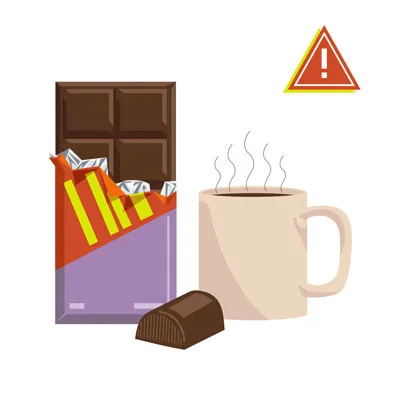 Pieces of dark chocolate and cocoa powder
Pieces of dark chocolate and cocoa powder
Grapes and Raisins
Grapes and raisins are exceptionally dangerous for dogs. These fruits can cause severe problems, including acute kidney failure, because their tartaric acid is toxic to a dog’s kidneys. Even a few bites can wreak havoc on their system. Symptoms of raisin or grape poisoning include vomiting, diarrhea, loss of appetite, changes in urine output, or complete anuria (absence of urine).
Macadamia Nuts, Almonds, and Pistachios
Macadamia nuts can cause dogs to suffer from numerous painful symptoms, including weakness, overheating, and vomiting. While the exact mechanism of their toxicity remains somewhat mysterious, these nuts are definitively considered toxic to dogs. As few as six macadamia nuts can lead to severe poisoning in a small dog.
Although macadamia nuts are the most dangerous, other nuts like pistachios and almonds can also pose choking hazards, especially if they are flavored or spiced. It is best to avoid feeding any nuts to your dog.
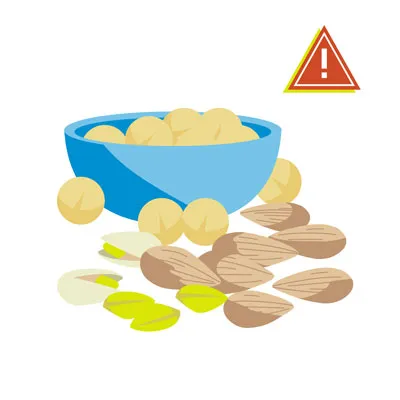 Close-up of macadamia nuts in their shells and shelled
Close-up of macadamia nuts in their shells and shelled
Milk and Dairy Products
Milk and other dairy products should be considered on a case-by-case basis. Some dogs can tolerate milk or dairy products without issue. However, many dogs are lactose intolerant or allergic, and may experience diarrhea and gas if they consume cow’s milk.
Ice cream is also unsuitable for dogs due to its high sugar and fat content. Instead of ice cream, try offering your pup frozen bites of healthy fruits that are safe for dogs. As for cheese, it can be given in small quantities, but opt for lower-fat varieties as an occasional treat rather than high-fat options.
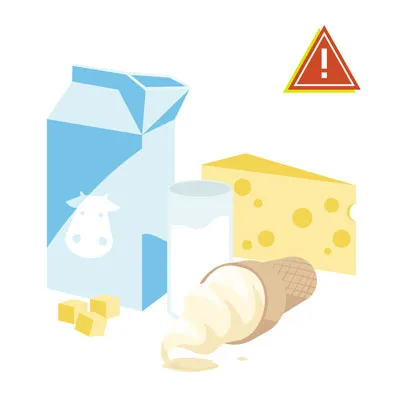 Glass of milk next to a block of cheese
Glass of milk next to a block of cheese
Mushrooms
It is always safest to err on the side of caution and avoid feeding your dog any mushrooms. Wild mushrooms, in particular, contain a variety of toxins that can cause kidney and liver failure, vomiting, diarrhea, hallucinations, and damage to red blood cells. While washed, white mushrooms from a grocery store might seem benign, it is probably safer to choose a different treat for your pet.
Nutmeg and Cinnamon
Dogs should never be fed any foods containing nutmeg. This spice can induce hallucinations and severe vomiting due to a compound called myristicin. Its effects are strongest when consumed in high doses or by smaller dogs. If your dog ingests any amount of nutmeg, contact your veterinarian for guidance immediately.
Cinnamon should also be avoided, not primarily because it’s toxic, but because it can irritate your dog’s mouth and sometimes lead to a dangerous drop in blood sugar, which can have serious health consequences.
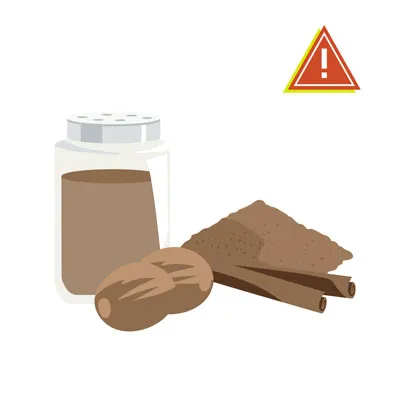 Whole nutmegs and cinnamon sticks
Whole nutmegs and cinnamon sticks
Onions, Garlic, Chives, and Leeks
Many pet owners are surprised to learn that herbs belonging to the allium family, such as onions and garlic, are unsafe for their dogs. Onions and garlic contain sulfoxides and disulfides, compounds that can damage red blood cells and cause anemia in both cats and dogs. These powders are frequently found in many prepared foods, including some baby foods, so always read labels carefully before offering store-bought items to your pet.
In fact, all allium plants, including chives and leeks, can cause potentially fatal anemia in dogs and cats. Certain Japanese breeds, such as Akitas and Shiba Inus, are particularly sensitive to allium plants, but these plants are dangerous for all dogs.
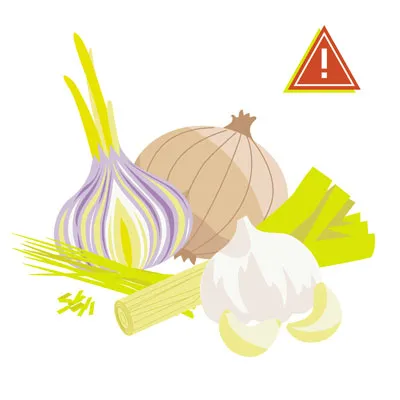 Sliced onions, garlic cloves, chives, and leeks
Sliced onions, garlic cloves, chives, and leeks
Salt
Excessive amounts of salt can disrupt the fluid balance in your dog’s cells. Too much salt can lead to tremors, seizures, diarrhea, or even a coma. Whether your dog is begging for a bite of rock salt, homemade play dough, or salty potato chips, do not let their pleading eyes compromise their health.
Spicy Food
Keep your pup away from any spicy food. Hot, spicy ingredients can cause vomiting, stomach ulcers, or diarrhea, which can be extremely painful for your dog and potentially costly in emergency veterinary bills.
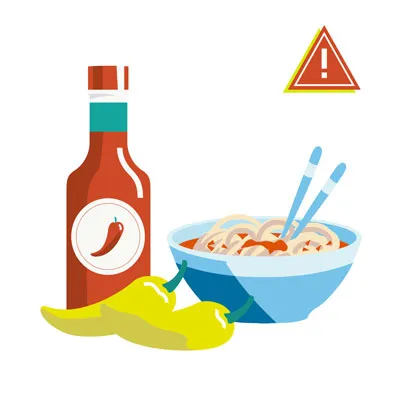 Red chili peppers and other spices
Red chili peppers and other spices
Sugar-Free Gum and Candy (Xylitol)
Xylitol is an artificial sweetener found in many human foods, including sugar-free gum, candy, and baked goods. In dogs, however, it can cause a rapid and dangerous drop in blood sugar, leading to weakness and seizures. Some dogs may also experience liver failure.
Cases of dog poisoning involving xylitol are on the rise. The amount of xylitol found in just five pieces of sugar-free gum has the potential to be fatal to a 65-pound dog.
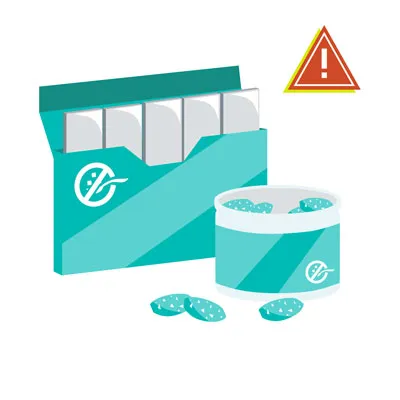 Various sugar-free candies and chewing gum
Various sugar-free candies and chewing gum
Tomatoes and Raw Potatoes
Tomatoes and potatoes fall into the category of foods that are safe in some forms but unsafe in others. A ripened red tomato is generally acceptable for dogs. However, the green parts of the tomato plant, along with green, unripe tomatoes, contain solanine, which is toxic to dogs.
Potatoes follow a similar rule. If baked or boiled without additives, they are generally safe in small amounts. However, raw potatoes also contain solanine, making them toxic to dogs.
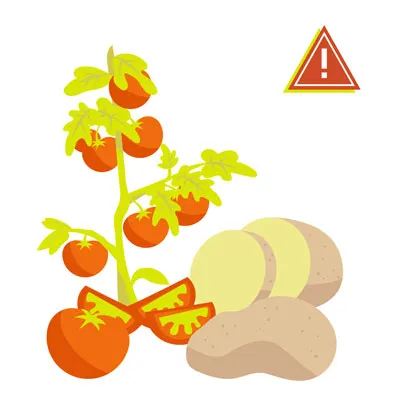 Ripe red tomatoes and raw potatoes
Ripe red tomatoes and raw potatoes
Tobacco
Tobacco is extremely dangerous and unhealthy for your dog. Exposure to nicotine-containing products can cause a wide range of symptoms, including vomiting, diarrhea, rapid or labored breathing, agitation, abnormal heart rate, wobbliness, weak muscles, high or low blood pressure, seizures, and tremors.
More significant or frequent exposure to tobacco can lead to blue gums and coma, and may ultimately prove fatal. Dogs are naturally curious and might encounter a discarded cigarette on a walk or investigate an ashtray. If your dog ingests any tobacco, immediate veterinary attention is crucial.
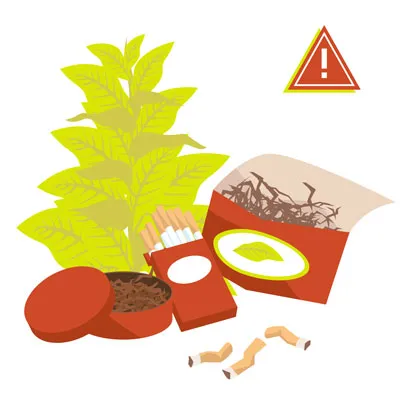 Cigarettes and tobacco products
Cigarettes and tobacco products
Yeast and Raw Dough
Yeast and raw dough are unsafe for dogs for multiple reasons. Raw dough can expand significantly in your dog’s stomach, causing severe pain and potentially life-threatening conditions like gastric torsion or stomach rupture.
Furthermore, the yeast and sugar in raw dough can ferment, producing alcohol. This can lead to alcohol toxicity, which can quickly become fatal and requires immediate medical intervention.
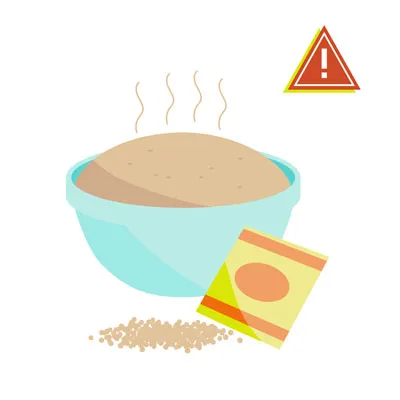 Bowl of raw dough with active yeast
Bowl of raw dough with active yeast
Raw Meat
Never feed your dog raw or undercooked meat. The possible presence of Salmonella or E. coli bacteria in raw meat can be harmful to dogs, just as it is to humans. Additionally, dogs can choke on bones found in raw meat, leading to serious internal injuries or obstruction.
Rhubarb
Rhubarb, often used in desserts, is not safe for pets. This plant contains soluble calcium oxalate crystals in its leaves. If consumed in large enough quantities, these crystals can bind with calcium in the dog’s body, causing a dangerous drop in calcium levels and potentially leading to renal failure. Symptoms include tremors, weakness, drooling, bloody urine, changes in thirst and urination, and vomiting.
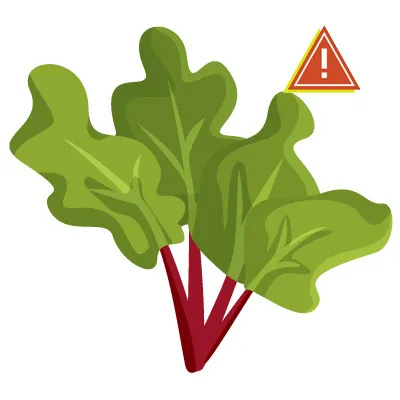 Freshly picked rhubarb stalks and leaves
Freshly picked rhubarb stalks and leaves
Star Fruit
Similar to rhubarb, star fruit also contains soluble calcium oxalate crystals. It is best to prevent your dog from snacking on this fruit due to the potential health risks it poses.
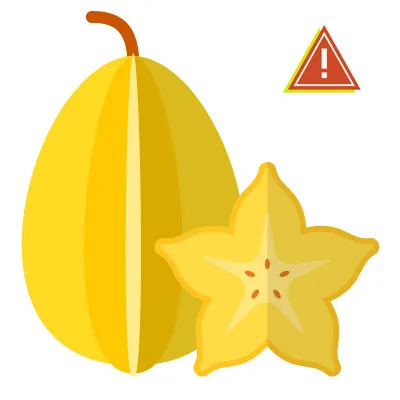 Sliced star fruit on a white plate
Sliced star fruit on a white plate
Flavored Water and Seltzer Water
When it comes to your dog’s hydration, it is always best to err on the side of caution and provide fresh, clean plain water rather than anything flavored or carbonated. Seltzer and flavored waters can contain added ingredients that are dangerous for pups, such as sugar or salt. While plain seltzer water might be acceptable in very small, urgent amounts, it can still lead to gas and bloating. Sticking to plain water is the safest choice.
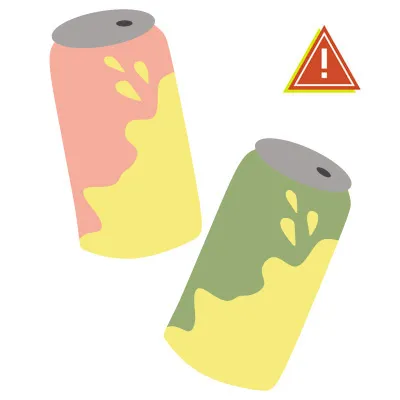 Glass of seltzer water with lemon slice
Glass of seltzer water with lemon slice
Safe Human Foods for Your Dog
While the list of foods your dog cannot eat is extensive, there are also numerous safe and healthy human foods they can enjoy! Some of the safest and most popular options include small amounts of dehydrated chicken or beef, apples (without the core), green beans, and carrots. Here are some common foods that can be safely incorporated into your dog’s diet, offering you guidance on what can i give a dog to eat responsibly.
Apples, Oranges, and Bananas
You must avoid apple cores and seeds due to their toxicity, but the fleshy parts of apples, free from seeds, are perfectly fine for your dog. It’s best to cut small pieces to eliminate any risk of your dog ingesting the core. Oranges are safe when given in small quantities. In moderation, bananas (peeled) can also be a delightful treat for your canine friend.
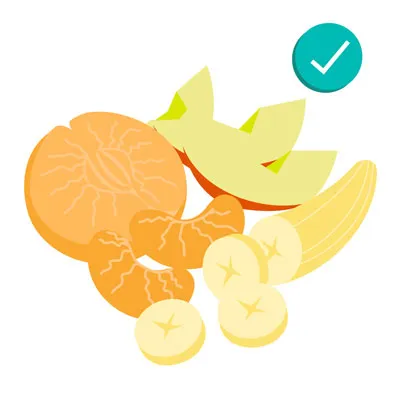 Apples, oranges, and bananas arranged together
Apples, oranges, and bananas arranged together
Blueberries and Blackberries
Blueberries are a delicious and healthy treat that your dog will likely adore. These small fruits are packed with antioxidants, fiber, phytochemicals, and vitamin C, all of which contribute positively to your pup’s health. Blackberries also offer similar nutritional benefits and can be a good addition to their diet in moderation.
Cantaloupe, Mango, Peaches, Pears, Pineapples, and Watermelon
There’s a wide variety of fruits your dog can safely enjoy, so feel free to experiment and discover their favorites! Cantaloupe is an excellent starting point. Your dog might also love watermelon, provided you remove all rinds and seeds (including the pale seeds often found in seedless varieties) to prevent choking. Given its high water content, watermelon can be particularly refreshing on a warm day.
Mangoes, peaches, pears, and pineapples are also safe in moderation. Always ensure that you remove all seeds, pits, and cores before offering these fruity delights to your pup.
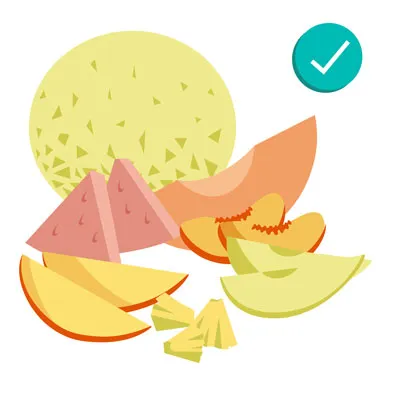 Various fruits including cantaloupe, mango, peaches, and pineapples
Various fruits including cantaloupe, mango, peaches, and pineapples
Carrots, Cucumber, and Celery
For additional healthy snack ideas, remember the three C’s: carrots, cucumbers, and celery. These vegetables and fruits are particularly excellent options for overweight dogs due to their very low-calorie content.
Bite-sized carrot pieces offer a satisfying crunch that many dogs enjoy. Celery bites also provide a fun crunch and can even help with bad breath. Cucumber slices are rich in vitamins and minerals, with very few carbohydrates or fats.
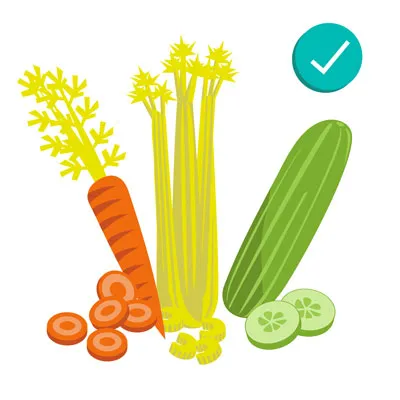 Fresh carrots, cucumber slices, and celery sticks
Fresh carrots, cucumber slices, and celery sticks
Cheese
While dogs should generally avoid large quantities of milk and most dairy products, a small amount of cheese given occasionally can be acceptable, provided you know your dog is not lactose intolerant. Always remember that some cheeses can be high in fat, which can be detrimental to dogs. Therefore, opt for lower-fat varieties, such as a small piece of mozzarella, or consult your veterinarian for the best type of cheese to offer.
Eggs
Fully cooked eggs can be a tasty and beneficial treat for your dog. Scrambled eggs, in particular, can help soothe an upset stomach and provide an excellent source of protein. Ensure eggs are cooked thoroughly to avoid any risk of Salmonella.
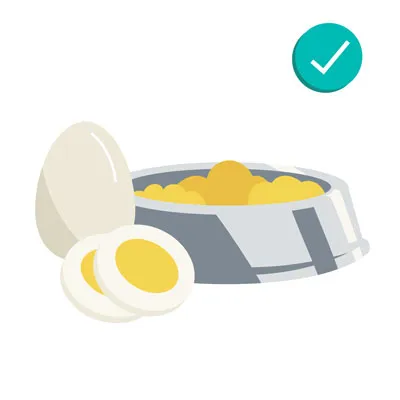 Cooked eggs, possibly scrambled or hard-boiled
Cooked eggs, possibly scrambled or hard-boiled
Peanuts, Peanut Butter, and Cashews
Peanuts and cashews are safe for dogs when given in small quantities. However, due to their high-fat content, you should offer them only occasionally as a treat. Ensure they are unsalted, unflavored, and unseasoned.
Regarding peanut butter, in moderation, it is a delicious and protein-rich treat for your pup. Always look for unsalted peanut butter and, most importantly, avoid any sugar-free varieties that may contain xylitol, which is toxic to dogs.
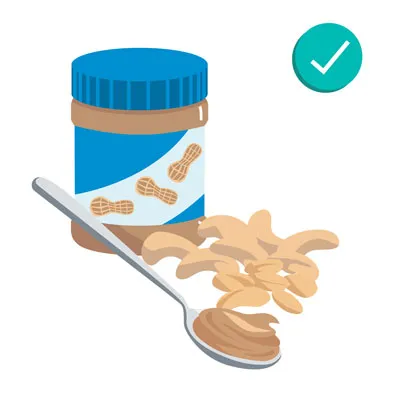 Shelled peanuts, peanut butter in a jar, and cashew nuts
Shelled peanuts, peanut butter in a jar, and cashew nuts
Popcorn and Corn
Popcorn is another enjoyable treat that your dog might love. Choose air-popped, unsalted, and unbuttered popcorn. Carefully inspect the popcorn to ensure there are no unpopped kernels, which could pose a choking hazard for your pup.
Naturally, corn (removed from the cob) is also acceptable when served without butter, salt, or spices. It can be a healthy and fibrous addition to your dog’s diet.
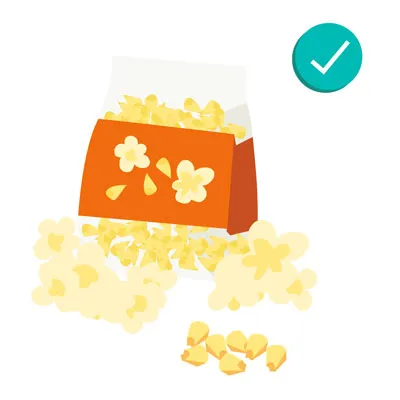 Bowl of popcorn next to corn on the cob
Bowl of popcorn next to corn on the cob
Coconut and Honey
In small quantities, coconut is generally fine for your dog, including coconut milk and coconut oil. It contains lauric acid and may even help with certain allergies. However, some dogs might experience an upset stomach from fresh coconut or coconut milk, so introduce it cautiously. Avoid coconut water, which is not safe for dogs. Also, never allow your dog to eat the fibrous shell, as it could cause choking.
Honey, in moderation, is also safe and provides numerous vitamins and minerals that are beneficial for your pup’s health.
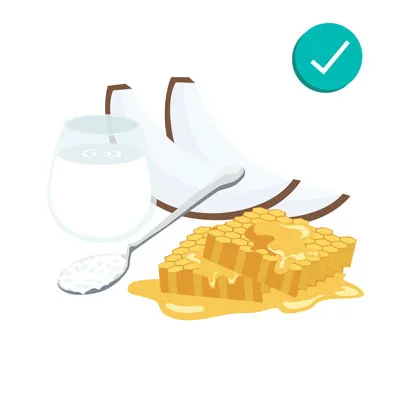 Fresh coconut halves and a jar of honey
Fresh coconut halves and a jar of honey
Shrimp and Fish
Plain, fully cooked shrimp makes an excellent choice for your dog. Remember to remove the shell, head, tail, and legs, and avoid any shrimp that has been seasoned, salted, or buttered.
Fish is also permissible, especially salmon and sardines. Always ensure the fish is plain, fully cooked, and completely boneless. A good general guideline is to feed your dog fish no more than twice a week. Plain, canned tuna, packed in water (not oil), is safe in moderation to avoid excessive mercury and salt content.
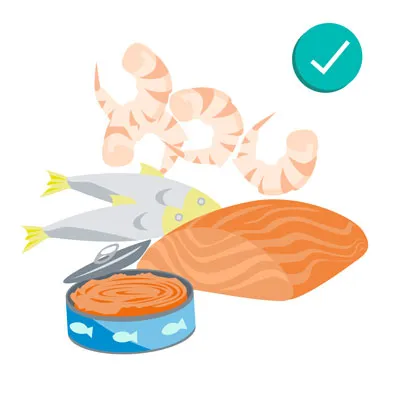 Cooked shrimp and whole fish (salmon or similar)
Cooked shrimp and whole fish (salmon or similar)
Turkey
Turkey meat is a healthy and safe option for dogs once the skin, fat, and bones have been removed. Offer small bites of plain, unseasoned turkey as a delicious treat and a fantastic source of lean protein. Always avoid anything seasoned or salted.
Grains, Wheat, and Quinoa
What about grains, wheat, or quinoa? Similar to corn, a little bit of wheat or other grains is perfectly fine for dogs. Quinoa, in particular, is often considered a healthier filler option than many others. As with any new food, keep a close eye out for any signs of allergic reactions.
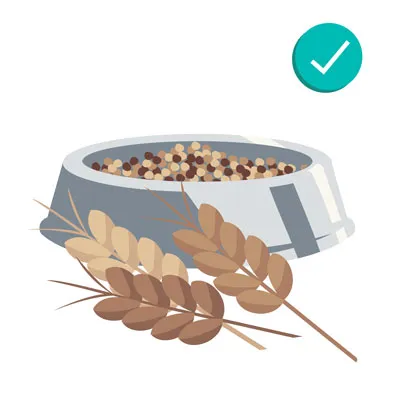 Various grains including wheat, oats, and quinoa
Various grains including wheat, oats, and quinoa
Green Beans
Many dogs thoroughly enjoy green beans, whether served raw, steamed, or straight from a can. They are safe, tasty, and healthy—a truly winning combination. Look for green beans that are either raw or cooked plainly, without added spices, oils, or salt. Cut them into small, bite-sized pieces to prevent any choking hazards.
Dogs Most at Risk if They Consume Toxic Foods
While it is crucial to prevent any dog from ingesting toxic foods, certain dogs are at a higher risk of severe reactions than others. Understanding these risk factors can help pet owners be even more vigilant.
- Small breeds vs. large breeds: Smaller dogs are inherently more vulnerable due to their lower body weight. For instance, even a small amount of chocolate can have a much more pronounced and dangerous effect on a tiny dog compared to a larger breed. This makes breed-specific considerations important, so knowing what should i not feed my bulldog is critical, as some breeds may have unique sensitivities.
- Puppies: Younger dogs have less developed digestive and immune systems, which puts them at greater risk from certain substances, including potentially even raw dog food. Their bodies are simply not as equipped to handle toxins.
- Elderly dogs: Older dogs may face higher risks due to other underlying health conditions they might have. For example, dogs with existing health problems should generally not be fed raw dog food.
- Dogs with pre-existing conditions: Many pre-existing health conditions, such as diabetes or kidney disease, can significantly increase a dog’s risk when exposed to toxic foods. Their compromised systems are less able to cope with additional stressors.
Preventing Your Dog from Eating Toxic Foods
While accidents can sometimes occur despite our best efforts, you can take several proactive steps to minimize the risk of your beloved pup getting into unsafe human food.
1. Store Foods Out of Reach
Ensure that your dog cannot access any toxic foods. Keep dangerous items on high shelves that are too tall for your dog to reach, or securely locked away in cabinets that your pup cannot open.
2. Avoid Feeding Dogs From Your Plate
Establish a strict rule against feeding your dog directly from your plate or offering them food in the kitchen while you are cooking, even if you just intend to give them a small, seemingly harmless treat. It is safest to only provide your pup with treats that are specifically manufactured for dogs.
3. Educate Family Members and Guests
It is important to educate all family members, including children, and any guests who visit your home. Make sure they understand that no matter how tempting it may be to share food with your dog, they should never sneak any human food to your pet without your explicit permission and knowledge of what is safe.
4. Be Careful During Holidays
Exercise extra caution during holidays and special occasions, as the busy atmosphere can often make it easy to let your guard down while you are cooking or entertaining. The increased presence of diverse foods and distractions elevates the risk. If, despite your precautions, your dog manages to eat something toxic, being prepared can help you act quickly. Keep emergency contact information readily accessible for 24/7 veterinary services, including during holidays, or for pet poison control centers.
What To Do if Your Dog Eats Something Toxic
If you suspect your dog has ingested toxic food, it is paramount to seek help as quickly as possible.
You should be familiar with the common symptoms of food toxicity so you can promptly recognize if your dog has eaten something harmful. The specific symptoms can vary depending on what your pup consumed, but may include listlessness, distress, pain, vomiting, bloody stools, or a bloated stomach that feels hard to the touch due to gas. This painful condition can lead to stomach rupture if not treated urgently.
If you observe these symptoms, take the following immediate actions:
- Call your veterinarian or a poison control center right away. Time is of the essence in these situations. Treatments are generally more successful, and hospitalization periods are shorter if a dog receives rapid medical attention.
- Be prepared with all essential information. This includes the type of food eaten, the estimated amount consumed, and the approximate time of ingestion.
- Avoid home remedies unless specifically advised by your veterinarian. Remedies can vary significantly depending on the ingested substance, and even inducing vomiting can be harmful in certain cases.
Keeping Your Dog Healthy and Safe
From household toxins to dangerous human foods, it can be challenging to keep track of everything your dog should avoid. Dogs don’t always have the most discerning taste, but by following this guide and remaining vigilant, you can significantly help protect your dog from foods that could harm them.
The good news is that there are plenty of safe and healthy foods that your dog can enjoy! Discover which safe foods from our list your dog loves, and offer them as well-deserved treats. If you are ever uncertain about any food item, always consult with your veterinarian for expert advice.
